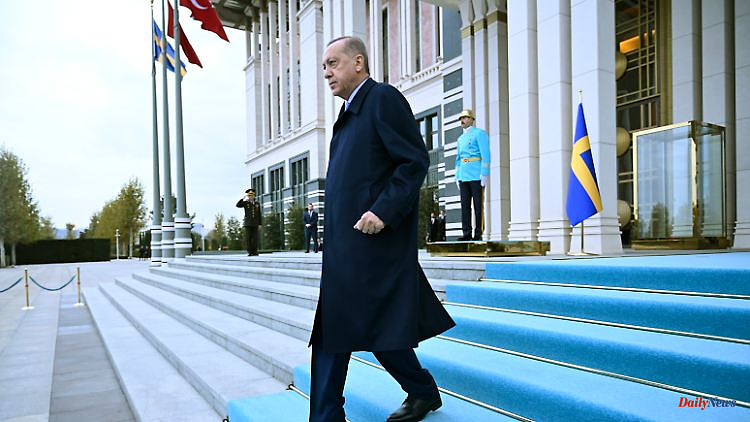Turkey is pushing its blockade against Finland and Sweden joining NATO even further. Before a meeting of foreign ministers, the government is calling for "concrete steps". Meanwhile, the opposition in Ankara is planning to restrict President Erdogan's powers.
Turkish Foreign Minister Mevlut Cavusoglu wants to meet the foreign ministers of the two countries tomorrow, Tuesday, because of Sweden and Finland's desire to join NATO. "The process is going well" - but there are still further steps to be taken, said Cavusoglu, according to the state news agency Anadolu. The trilateral meeting is to take place on the fringes of the NATO foreign ministers' meeting in Bucharest. A meeting between Cavusoglu and Federal Foreign Minister Annalena Baerbock is also planned there, it said.
There are still expectations of "concrete" steps, such as "legal regulations" and "extraditions," said Cavusoglu. There are problems especially with Sweden, he said. However, Stockholm had recently moved significantly towards Ankara. Ankara's demands include the extradition of alleged "terrorists". 28 out of 30 member states of the defense alliance have approved the accession of the northern European states, only in Hungary and Turkey the ratification of the accession protocols is still pending.
Ankara has so far refused to clear the way for admission, citing alleged Swedish and Finnish support for the Syrian Kurdish militia YPG, which Ankara regards as an offshoot of the banned Kurdish Workers' Party PKK and thus as a "terrorist organization". The EU, which includes Sweden and Finland, also considers the PKK a terrorist organization - but not the YPG.
For more than a week, Turkey has been using the "clawed sword" against Kurdish forces in Syria and Iraq. Ankara announced eight days ago that it had carried out airstrikes on semi-autonomous areas in northern and northeastern Syria and on the Iraqi border. In addition, Turkey threatened a ground offensive in the Syrian areas.
In Ankara, meanwhile, an alliance of six Turkish opposition parties presented a plan for constitutional changes in the run-up to the elections planned for 2023. According to the draft, the parliament and the legal system should be strengthened and the powers of the president should be significantly reduced, said politicians of the alliance. In 2017, the parliamentary system was replaced by a presidential system in a referendum, which gave President Recep Tayyip Erdogan significantly more power. Since then, Erdogan has been able to govern largely without restrictions. In addition, the judiciary is largely under government control, as the EU Commission has attested.
Presidential and parliamentary elections are expected to take place in Turkey in 2023. Turkey's six opposition parties have joined forces with the intention of replacing Erdogan and his AKP government. Observers have so far assumed that the parties will nominate a common candidate for the elections. The alliance is made up of the largest opposition party, the CHP, the national conservative Iyi party and the Deva party. Turkey experts had also interpreted Erdogan's confrontational course with NATO as an attempt to present himself to the voters as a strong man in domestic politics.












